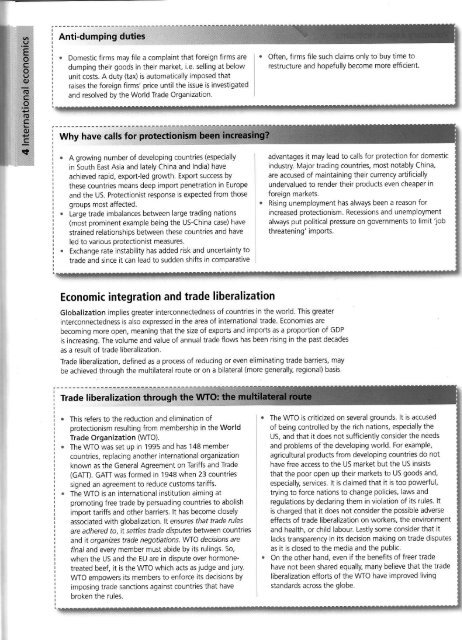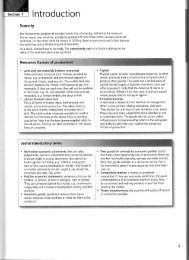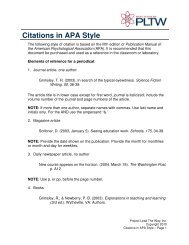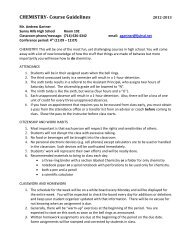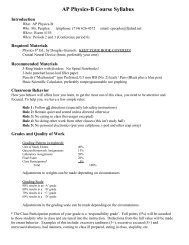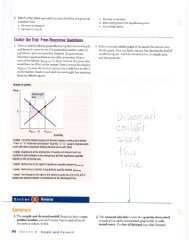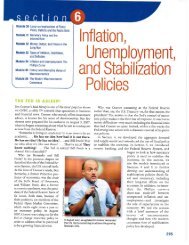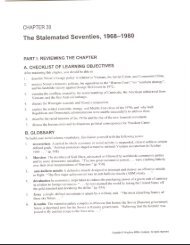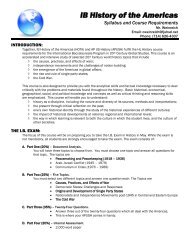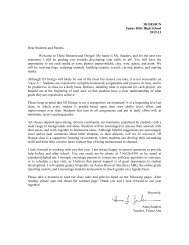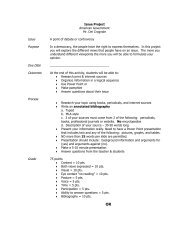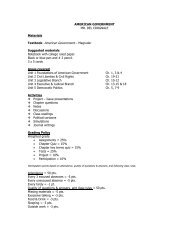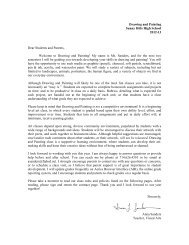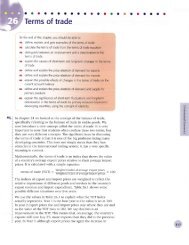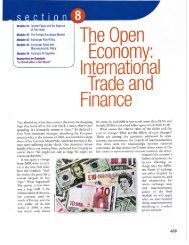IB Econ Study Guide Internationals - Sunny Hills High School
IB Econ Study Guide Internationals - Sunny Hills High School
IB Econ Study Guide Internationals - Sunny Hills High School
You also want an ePaper? Increase the reach of your titles
YUMPU automatically turns print PDFs into web optimized ePapers that Google loves.
: .:ll'<br />
I<br />
:F<br />
'H'<br />
6<br />
g o(::<br />
li<br />
's rE<br />
;<br />
Anti-dumping duties<br />
. Domestic firms may file a complaint that foreign firms are . Often, firms file such claims only to buy time to<br />
dumping their goods in their market, i.e. selling at below restructure and hopefully become more efficient.<br />
unit costs. A duty (tax) is automatica ly imposed that<br />
raises the foreign firms price until the issue is investigated<br />
and resolved by the World Trade organization.<br />
Why have calls for<br />
A growing number of developing countries (especially advantaqes it may lead to calls for protection for domestic<br />
in South East Asia and lately China and India) have<br />
industry l\y'ajor trading countries, most notably China,<br />
achieved rapid, export-led groMh. Export success by<br />
these countries means deep impori penetration in Europe<br />
are accused of maintaining their currency arlificially<br />
undervalued to render their products even cheaper In<br />
and the US. Protectionist response is expected from those<br />
groups most affected.<br />
foreign markets.<br />
. Rising unemployment has always been a reason for<br />
Large trade imbalances between large trading nations<br />
(most prominent example being the Us-china case) have<br />
increased protectionism. Recessions and unemployment<br />
always put political pressure on governments to limit'job<br />
strained relationships between these countries and have<br />
led to various protectionist measures.<br />
Exchange rate instability has added risk and uncertainty to<br />
trade and since it can lead to sudden shifts in comparative<br />
threatening'imports.<br />
<strong>Econ</strong>omic integration and trade liberalization<br />
Globalization implies greater interconneqtedness of countries in the world. This grealer<br />
interconnectedness is also expressed in the area of international trade. <strong>Econ</strong>omies are<br />
becoming more open, meaning that the size of exports and imports as a proportion of GDP<br />
is increasing. The volume and value of annual trade flows has been rislng in the past decades<br />
as a result of trade liberalization.<br />
Trade liberalization, defined as a process of reducing or even eliminating trade barriers, may<br />
be achieved through the multilateral route or on a bilateral (more generally, regional) basis<br />
Trade liberalization<br />
Thls refers to the reduction and elimination of<br />
protectionism resulting from membership in the World<br />
Trade organization (WTO).<br />
The WTO was set up in 1995 and has 148 member<br />
countries, replacing another international organization<br />
known as the General Agreernent on Tariffs and Trade<br />
(GATI. GATT was formed in 1948 when 23 countries<br />
signed an agreement to reduce customs tariffs.<br />
The WTO is an international institution aiming at<br />
promoting free trade by persuading countries to abolish<br />
import tariffs and other barriers. lt has become closely<br />
associated with globalization. ll ensurcs that trade rules<br />
are adhered to, it selties trade d/sputes between countries<br />
and it organizes trade negotiations. \MO decisions are<br />
fmai and every member must abide by its rulings. So,<br />
when the US and the EU are in dispute over hormonetreated<br />
beef, it is the WTo which acts as judge and jury<br />
WTO empowers its members to enforce its decisions by<br />
imposing trade sanctions against countries that have<br />
broken the rules.<br />
The WTO is criticized on several grounds. lt is accused<br />
of being controlled by the rich nations, especially the<br />
US, and that it does not sufficiently consider the needs<br />
and problems of the developing world. For example,<br />
agricultural products from developing countries do not<br />
have free access to the US market but the US insists<br />
that the poor open up their markets to US goods and,<br />
especially, services. lt is claimed that it is too powerful,<br />
trying to force nations to change policies, laws and<br />
regulations by declaring them in violation of its rules. lt<br />
is charged that it does not consider the possible adverse<br />
effects of trade liberalization on workers, the environment<br />
and health, or child labour. Lastly some consider that it<br />
lacks transparency in its decision making on trade disputes<br />
as it is closed to the media and the publlc.<br />
On the other hand, even if the benefits of freer trade<br />
have not been shared equally, many believe that the trade<br />
liberalization efforts of the WTo have improved living<br />
standards across the globe.


